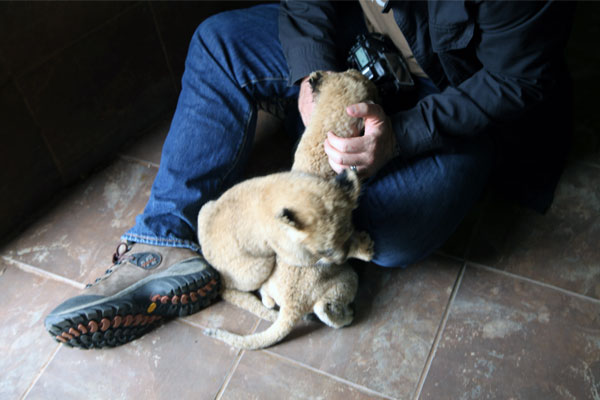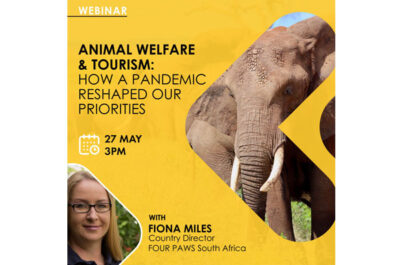First-of-its-kind study, published in Animals, analyses YouTube videos to substantiate stress behaviours from lion cubs handled by tourists seeking the so-called Simba effect.
CAPE TOWN – New research on a popular wildlife tourist attraction known as "cub-petting" reveals the practice has negative welfare consequences for big cats. According to a new study led by New York University and FOUR PAWS, cub-petting normalises touching young lions, perpetuates captive breeding, and has dire implications for the African lion species.
Published in the Special Tenth Anniversary Issue of Animals, the study addresses the problem of cub-petting tourism and the harm it inflicts on lions. Cub-petting (and cuddling) is a term for the practice of using young animals, mainly big cats like lions and tigers, as play toys and/or photo props for paying customers.
To address the question of cub welfare at cub‐petting facilities in South Africa, researchers analysed public tourist videos on YouTube to gain information about animal behaviour, husbandry practices, and captive living conditions that are difficult to otherwise record.
As with other forms of tourism, “selfie” culture abounds in cub-petting and social media provides a unique source of animal behaviour and welfare data. Through analysis of 267 videos, the researchers narrowed down a 49-video database of tourist-lion interactions at cub facilities.
An estimated 61% of cubs were under 3 months old, two videos show cubs as young as 9 days old and 1 day old, with their eyes still shut. The mother lion was apparent in only 1 of 49 videos. In this industry, cubs on display are frequently separated from their mothers and forced to interact beyond the species’ normal waking hours. Researchers found cubs regularly exhibited stress behaviours, including avoidance and aggression.
“Our findings show that cub-petting facilities may cater to people with good intentions for the lions, but there are still grave welfare concerns,” says co-author Dr. Becca Franks.
"Lions who begin their lives in such facilities become part of a larger cycle of harm including the canned hunting industry, the exotic pet trade, and the black market for wildlife parts. While these activities are well-known, the exploitation of cubs at tourist attractions is less well understood.”
Franks is Assistant Professor of Environmental Studies and Co-Director of the new NYU Wild Animal Welfare Program, which seeks to advance understanding of wild animals and how humans can improve our interactions with them. Co-authors include two recent NYU Animal Studies and Environmental Studies graduates, as well as staff from the U.S. Office of FOUR PAWS International, the global animal welfare organization. Hildegard Pirker, a big cat behaviour expert at LIONSROCK, a FOUR PAWS big cat sanctuary in South Africa, evaluated the videos and methodology for accuracy, reliability, and welfare assessments.
The study concludes that cub-petting facilities perpetuate harm to young lions, normalise the touching of lions, and propagate captive breeding. These issues have implications not only for the captive lion industry in South Africa but for the overall welfare and conservation of a species.
“As travel continues to rebound, tourists may seek out immersive animal experiences," says co-author Saryn Chorney, a recent graduate of the NYU Animal Studies program and journalist who writes about animals, human health, and cultural sustainability.
Says Chorney: "The so-called ‘Simba effect,’ named for a popular character from The Lion King, is a term used to describe the tourist pastime of holding or petting lion cubs while taking selfies and videos to post on social media. Before visiting LIONSROCK, I was unaware of the lion farming industry and the role cubs play as a first stage in the commodification cycle of big cats.”
The Director of FOUR PAWS in South Africa, Fiona Miles, says the study shows unsuspecting animal lovers, through supporting the petting industry, could be contributing to the decimation of the lion population.
Says Miles; “Instead of visiting a cub petting facility, rather support a true big cat sanctuary that is a facility that do not breed, trade or offer interactions, but instead provide a forever home to animals that cannot be returned to the wild.”
The IUCN Red List classifies African lions as a vulnerable species, and lions are also listed as a threatened species under the U.S. Endangered Species Act. The African lion population has plummeted from approximately 75,000 to 30,000 wild individuals in the past 20 years.
Currently, there are likely more lions in captivity (breeding farms, safari parks, zoos than living freely in the wild. Although lions once roamed Europe, the Middle East, India, and Africa, they now live on less than 25% of their original historical range. It is estimated that lions are bred on some 300 farms for trophy hunting purposes in South Africa, and cub-petting is an integral part of this economy.
This study brings light to questions surrounding cub facilities – where the cubs originate, how they are treated and housed, and what happens to them after they become too large to interact with tourists – as welfare concerns throughout the captive lion life cycle.
FOUR PAWS believes these wild animals suffer under inadequate keeping conditions from lack of expert care, frequent traveling, training, and/or intensive and forced interaction with humans. Therefore, the organization works to end the commercial use and trade of big cats around the world, which includes the practices of private keeping and captive breeding, trophy hunting, and cub-petting.
“This study is particularly timely,” explained co-author Claire LaFrance from FOUR PAWS International. “We are seeing these kinds of interactive activities with wild animals prove dangerous for both humans and big cats. In the past few years however, we have seen positive progress towards ending the cycle of cub abuse with the fall of Joe Exotic (Tiger King) in the U.S., and the closing of Black Jaguar White Tiger in Mexico.”
As wildlife interactions relate to the global pandemic, unnecessary and inappropriate contact with wild animals, inclusive of tourist attractions such as cub-petting, is a dangerous aspect of modern life that ought to be left in the past.
Vicky is the co-founder of TravelDailyNews Media Network where she is the Editor-in Chief. She is also responsible for the daily operation and the financial policy. She holds a Bachelor's degree in Tourism Business Administration from the Technical University of Athens and a Master in Business Administration (MBA) from the University of Wales.
She has many years of both academic and industrial experience within the travel industry. She has written/edited numerous articles in various tourism magazines.













































































































































































































